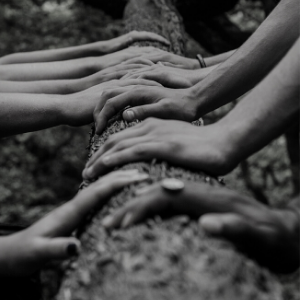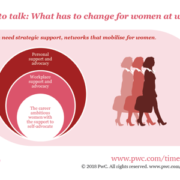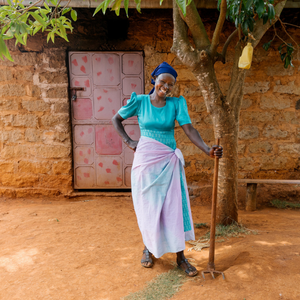International Women’s Day Coverage: Professional Women in Nigeria
International Women’s Day is an opportunity for theglasshammer.com to look at the status of professional women in other parts of the world. Africa is a huge continent with varying business environments. South Africa gets the most attention followed by somewhat negative attention for Nigeria due to reported high levels of corruption.
Nigeria is Africa’s most populous country and largest economy is in the midst of an workplace equality revolution. How easy is it for Nigerian woman to climb the corporate ladder in modern day Nigeria?
Today, the participation of women in corporate managerial roles is being discussed at all levels of Nigerian society. Traditionally a Nigerian woman’s place was by her husband’s side but todays Nigeria is becoming a much different society. In the last decade women have held positions of leadership in the Nigerian Medical Association, Nigerian Bar Association and the Institute of Chartered Accountants. In government, the two important cabinet positions of finance and petroleum are also held by Nigerian women. These advances have stirred Nigerian public sentiment over the viability of women in positions of power. The minister of Nigerian finance, Diezani Alison-Madueke recently felt the need to state, “We are there not because we are women. We are there because of our competence as managers.”
The present reality and the future progress
Despite being well educated with the appropriate training and experience Nigeria is still facing a problem when it comes to getting women into top level positons in the corporate world. But the ambitions of young, professional Nigerian women seem to be rising to meet this challenge. In a 2008 survey conducted by Nigeria’s University of Ilorin, 52.5% of female Nigerian managers were 21 to 30 years of age while only 25% were between 31 to 40 and 15% were between 41 to 50 years old. This represents a massive boom in the early hiring of young female professionals into Nigeria’s managerial roles. The Chairperson and Chief Executive of Britannia U Group, an oil and gas conglomerate, Catherine Uju Ifejika said, “We are able to hold your homes together, and we are beginning to translate that into boardroom jobs, and then owning companies. In six years I have formed seven companies.”
Today’s recent rise in public discussion and government interest in the participation of women in the corporate world comes from newly published studies on the economic benefits of female participation. A big push to include women comes from the economic success of neighboring South Africa and its relative achievements in this area. Winihin Ayuli-Jemide, a Lagos-based entrepreneur and former lawyer said of South Africa’s women, “They dominate the low capital businesses, the ‘informal sector’ such as manufacturing knitwear, tie and dye and homemade food for sale in municipal markets.” She sees this as the key to South Africa’s success but wants Nigeria’s women to aim higher. She cites investment, particularly in oil and gas as Nigerian women’s most efficient way to gain economic and power equality.
International studies also seem to have had a large impact on Nigeria’s view of professional women. McKinsey and Company, a multinational management consulting firm, has since 2007 published a series of surveys and studies entitled Women Matter. The overall conclusion of these studies is that companies with a higher female representation at the executive level maintain a higher economic output than those with lower representation. Winihin Ayuli-Jemide welcomes the influence of these studies and cites the need for more African based research. She says, “In Africa we really don’t have information about gender issues, nothing on how we are doing in the economy.”
A lack of mentorship for rising women in the corporate world has also been blamed for Nigeria’s lack of women in senior positions. And women who attempt to learn are sometimes seen as more of a secretary and/or mistress then colleague. A respondent to a survey conducted by Petroleum-Gas University of Ploiesti who has over 12 years in the corporate banking, oil and gas sectors had this to say. “There was a stage in my career where I was discriminated against as a family woman, when I was given a mentor, he was too bossy and spoke to me sometimes as if I were his girlfriend. He wanted me to stay late evening at work and wanted me to also meet up with him in restaurants, canteens… I could not keep up with these demands and our relationship became tense…. I prefer to have female mentor…it is easier to compare notes and learn from one another’s effort.”
Many Nigerian Women also feel that they must sacrifice their familial lives for the careers in an effort to appear more “macho”. In a 2011 survey by the Petroleum-Gas University of Ploiesti, a respondent was quoted, “The corporate environment here in Nigeria is difficult and very Macho. As a woman you have to strive harder and do twice as well as the guys in order to be noticed or succeed. Women are always considered not fully committed, especially if married with children”.
But despite deeply entrenched gender roles, Nigerian society’s view of women as professionals seems to be changing. The same survey mentioned in this article by University of Ilorin in 2008 showed that 90% of respondents believed Nigerian women were capable as managers and can possess leadership traits which are similar to their male co-workers. This indicates an encouraging trend that will possibly change gender dynamics further and will take time to play out in real working environments over the next ten years.
By Ben Rozon










